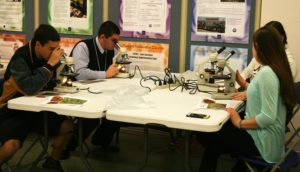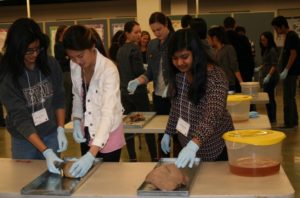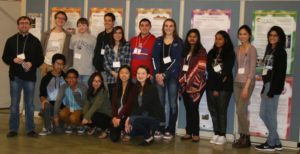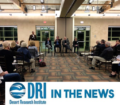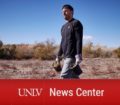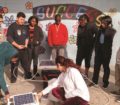STEM Career Investigation Program (SCIP)
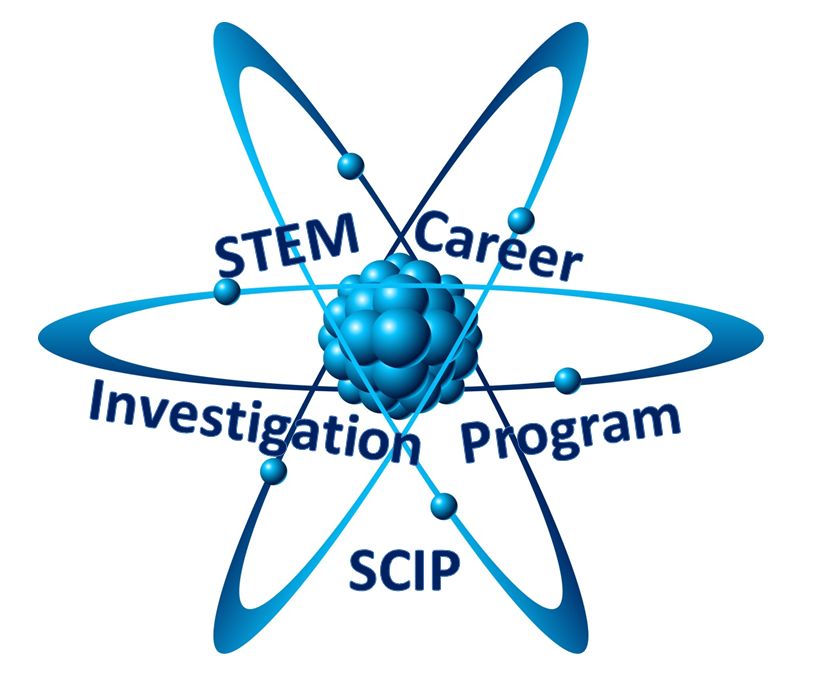
Spring 2016 marked the completion of the third year of the STEM Career Investigation Program (SCIP) for high school sophomores, juniors, and seniors in Northern Nevada. SCIP provides students with the opportunity to observe career presentations and discuss research by scientists and engineers in a wide array of specialties. Throughout the six week program, students learned how STEM disciplines are integrated into the workforce, and ways in which their future career paths could be approached. Speakers represented various departments at the University of Nevada, Reno, the University of Nevada, Reno School of Medicine, the Washoe County Sheriff’s Office, and businesses local to Northern Nevada. Speakers were invited to present their current research projects to the students and discuss future job possibilities for someone with their degree and area of specialization.
Spring 2017
The Spring 2017 Seminar Series is no longer accepting applications.
The 2017 SCIP seminar series, beginning February 2, 2017, is open to students enrolled in 10th-12th grade at high schools in the Reno/Sparks area. The seminar series will be held at the Raggio Research Center for STEM Education at the University of Nevada, Reno. http://www.unr.edu/raggio-center
WHO? – Applicant must be a sophomore, junior, or senior in a Washoe County School District high school. Student must be able to attend all or most of the sessions.
WHAT? – The STEM Career Investigation Program (SCIP) provides students with opportunities to observe research presentations by STEM professionals in a wide array of specialties in order to understand how the STEM disciplines are integrated.
The speakers for each seminar series will be announced to participants via email upon their acceptance into the program.
WHERE? – The Spring 2017 Seminar series will be held at the Raggio Research Center (RRC) on the 4th floor of the William Raggio College of Education Building (WRB) on the University of Nevada, Reno campus.
WHEN? – Thursdays from 5:30 to 7:30 pm
February 2, 2017; February 9, 2017; February 16, 2017; February 23, 2017; March 2, 2017; and March 9, 2017
WHY? – In addition, the presentations will outline possibilities for students’ future career paths. Speakers from the College of Engineering, College of Science, and other STEM related businesses will be invited to present their current research projects to the students and discuss future job possibilities for someone with their degree and area of specialization.
Applicants that attend every session will receive a certificate upon completion of the seminar series. Additionally, each time the applicant attends a seminar, their name will be put into a drawing for a prize that will be given at the end of the final seminar.
QUESTIONS? – If you have any questions, please email Shanelle Davis at: shanelles@unr.edu or call 775-784-7783.
The Spring 2016 SCIP seminar series ran from February 2 to March 8, 2016, for a total of six sessions. Every Tuesday evening from 5:30-7:30 p.m., twenty students from nine different high schools in Washoe County School District gathered at the Raggio Research Center for STEM Education. Twelve of the SCIP participants were female, eight were male, and 55% of the participants were underrepresented minorities.
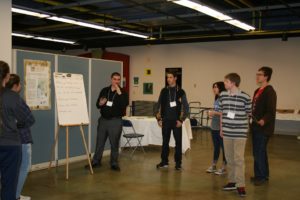 At the first SCIP session, students were introduced to Andy Stevenson, a Special Projects Associate at Tesla Motors. Andy has a background in law, business and science, and spoke about the available careers at Tesla’s new battery manufacturing plant (Tesla Gigafactory) in the Tahoe Reno Industrial Center.
At the first SCIP session, students were introduced to Andy Stevenson, a Special Projects Associate at Tesla Motors. Andy has a background in law, business and science, and spoke about the available careers at Tesla’s new battery manufacturing plant (Tesla Gigafactory) in the Tahoe Reno Industrial Center.
The second SCIP session featured Dr. Scott Mensing from the Geology Department at UNR. Dr. Mensing discussed his various degrees, his current career, and his research on climate change with mud cores. Students were given three different mud cores to examine and discuss. Dr. Mensing also supplied a variety of pollen samples which students were asked to identify using microscopes provided by the College of Education.
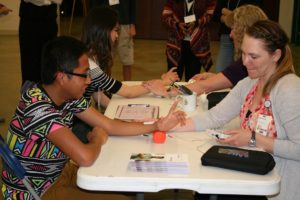 Presenting at the third SCIP session was Lead Occupational Therapist at Renown Health, Julia Hudson. Julia demonstrated the use of electrical stimulus to help treat patients experiencing impaired mobility due to injury, trauma or physical/ neurological deficits. She also brought a Functional Electrical Stimulus (FES) to show how stimuli can be used to help patients re-learn to pick up objects, move effectively, and even walk. Student volunteers, (who had waivers signed by their parents,) were connected to the FES using electrodes. Mild electrical impulses were directed at each student’s forearm, which caused them to move their fingers and/or wrists. This introduced SCIP students to a field in the medical industry of which they were previously unaware, and provided a meaningful and exciting demonstration of an activity they might do while on the job.
Presenting at the third SCIP session was Lead Occupational Therapist at Renown Health, Julia Hudson. Julia demonstrated the use of electrical stimulus to help treat patients experiencing impaired mobility due to injury, trauma or physical/ neurological deficits. She also brought a Functional Electrical Stimulus (FES) to show how stimuli can be used to help patients re-learn to pick up objects, move effectively, and even walk. Student volunteers, (who had waivers signed by their parents,) were connected to the FES using electrodes. Mild electrical impulses were directed at each student’s forearm, which caused them to move their fingers and/or wrists. This introduced SCIP students to a field in the medical industry of which they were previously unaware, and provided a meaningful and exciting demonstration of an activity they might do while on the job.
The fourth presenter was Dr. Jennifer Hollander from the Biology Department at UNR. Dr. Hollander discussed her work as a professor of human anatomy and physiology and her research in seed dispersal and ephedra. Additionally, Dr. Hollander brought some specimens of human organs, which SCIP students were allowed to examine and discuss. Two of Dr. Hollander’s anatomy lab students assisted with the presentation and the following lab session.
The fifth presenter was Dr. Richard Kelley from the Computer Science and Engineering Department at UNR. Dr. Kelley is part of the EPSCoR Nexus project Cyberinfrastructure team and presented information on his work in robotics, his educational background, and the different career paths available to him with his various degrees. Dr. Kelley also brought drones and a robot to demo with the students.
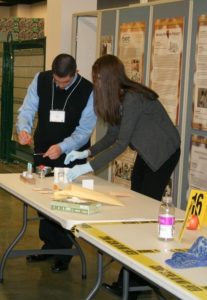 The sixth and final presenter was Dr. Brittany Baguley from the Forensic Science Division of the Washoe County Sheriff’s Office. Dr. Baguley discussed her research experience in Forensic Science, and her work as a Crime Scene Investigator. Dr. Baguley posed questions about real crime scenarios and cases to the students and had them solve the cases through DNA analysis and other forensic tests. She also conducted mini lab sessions in which students got to learn how to detect blood stains and how DNA samples taken from different areas of the human body can help identify a person.
The sixth and final presenter was Dr. Brittany Baguley from the Forensic Science Division of the Washoe County Sheriff’s Office. Dr. Baguley discussed her research experience in Forensic Science, and her work as a Crime Scene Investigator. Dr. Baguley posed questions about real crime scenarios and cases to the students and had them solve the cases through DNA analysis and other forensic tests. She also conducted mini lab sessions in which students got to learn how to detect blood stains and how DNA samples taken from different areas of the human body can help identify a person.
Feedback from SCIP participants, presenters, and the evaluation team was extremely positive for the third year of the program. Additionally, the results from analyzing the pre and post STEM Attitudes Survey showed an increase in positive attitudes toward STEM degrees.
Spring 2015
SCIP’s seminar series ran from February 4 to March 11, 2015. There were six sessions in total, occurring every Wednesday evening from 5:30-7:30 p.m. Forty-four students signed up for the SCIP sessions. Twenty-two of the participants were female and twenty-two were male with over 20% underrepresented minorities. The students came from eight different high schools in Washoe County School District.
At the first session, students were introduced to the career of chemical & materials engineer. The presenter was Dr. Ravi Subramanian from the Chemical & Materials Engineering department at UNR. Dr. Subramanian discussed his work on solar energy, he talked about nanostructured materials for solar energy utilization, and discussed his career with the students. Additionally, Dr. Subramanian brought examples to explain the working of energy through solar power. The second SCIP session featured Drs. Melissa Piasecki and Jennifer Hagen from the School of Medicine at UNR. They discussed their educational backgrounds, their work, and their research in the field of medicine. They made students aware of the different professions in the medical school, they talked about diverse fields like psychiatry and pharmacy and encouraged students to understand that one should keep an open mind while making a career choice. The third session presenter was Dr. Jennifer Hollander from the Biology Department at UNR. Dr. Hollander discussed her job as a professor of human anatomy and physiology and her research in seed dispersal and ephedra. Additionally, Dr. Hollander brought two of her anatomy lab students along to the presentation. With the help of these students, Dr. Hollander provided a hands-on experience with human organs for the students to explore in a separate lab session. Dr. Swatee Naik from the Mathematics and Statistics department at UNR was the fourth presenter. Dr. Naik discussed her background, her current job, and her research in Topology and Knot Theory. Dr. Naik conducted various activities including geometric figures and properties to explain her research. She also discussed the various career options in the mathematics and statistics field. The fifth presenter was Dr. Richard Kelley from the Computer Science and Engineering Department at UNR. Dr. Kelley is part of the EPSCoR Nexus project Cyberinfrastructure team and presented information on his work in robotics, his educational background, and the different career paths he could have taken with his various degrees. Additionally, Dr. Kelley brought examples of drones to share with the students. The sixth and final presenter was Dr. Brittany Baguley from the Forensic Science Division of the Washoe County Sheriff’s Office. Dr. Baguley discussed her varied background, her research experience in Forensic Science, and her work as a Crime Scene Investigator. Dr. Baguley provided real crime scenarios and cases to the students and had them solve the cases through DNA and other forensic tests. She also conducted mini lab sessions in which students actually got hands on experience on how to detect blood stains and how different samples from the body can help in determining one’s DNA.
Overall, the feedback from participants, presenters, and the evaluation team was extremely positive for the second year of the SCIP program. Additionally, the results from analyzing the pre and post STEM Attitudes Survey showed an increase in positive attitudes toward STEM degrees.
Spring 2014
SCIP’s seminar series ran from February 11 to March 18, 2014. There were six sessions in total, occurring every Tuesday evening from 5:30-7:30 p.m. Forty-one students signed up for the SCIP sessions with 32 students attending regularly. Twenty-four of the 32 regular participants were female and eight were male. The students come from ten different high schools in Washoe County School District.
At the first session, students were introduced to the career of marine biology and research conducted in Antarctica. The presenter was Dr. Chris Fritsen from DRI. Dr. Fritsen brought in a range of supplemental materials to show the students the equipment he worked with while doing his research. The second SCIP session featured Dr. Richard Kelley from the Computer Science and Engineering Department at UNR. Dr. Kelley is a roboticist and showed the students the advances in robotics that he has been working on at the university. The third session presenter was Dr. Jennifer Hollander from the Biology Department at UNR. Dr. Hollander explained her research with ephedra and also discussed her work as the head of the Human Anatomy and Physiology dissection team and lecturer for the Human Anatomy class on campus. The students got to work with materials that Dr. Hollander uses on a daily basis in her career. Dr. Scott Mensing from the Geography Department at UNR was the fourth speaker for SCIP. Dr. Mensing discussed his research with mud and brought mud cores in for the students to analyze. Additionally, Dr. Mensing used microscopes and pollen slides to engage the students in his research and every day work. The fifth session speaker was Dr. Danny Taylor from Mining Engineering at UNR. Dr. Taylor showed students videos of mines and brought two Mining Engineering students with him to interact with the participants. The final speaker was Dr. Michael Leverington from the Computer Science and Engineering Department at UNR. Dr. Leverington shared his varied background and educational experiences and discussed the importance of pursuing dreams throughout one’s life.
The research findings reflected that the participants were able to operationalize their career knowledge to some degree during the seminar series. Additionally, the findings were significant in regard to participants’ willingness to pursue STEM degrees after participating in SCIP.
Here are the videos taken of the 2014 SCIP presentations, in full:

